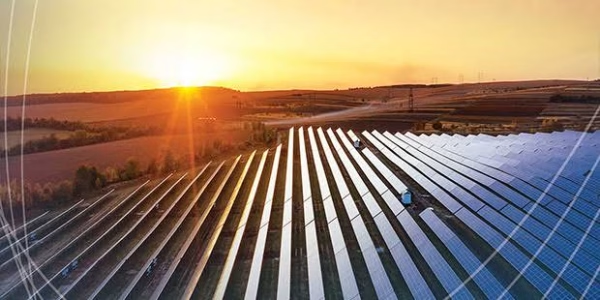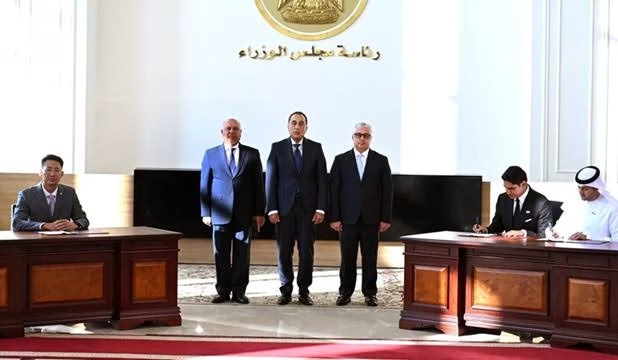Updated October 7, 2025- The Atom Solar Egypt Project will make a major contribution to Egypt’s clean energy transition. This will be achieved by establishing an integrated solar industrial park in the Suez Canal Economic Zone. Crucially, the complex will manufacture 2 GW of solar panels annually. It will also directly supply the local Egyptian and regional markets with essential renewable energy components, thereby increasing the deployment of solar power across the country.
By localizing the production of solar technology, the $220 million project not only enhances self-sufficiency but also positions Egypt as a regional hub for green industrial development, accelerating the nation’s broader green economic transition under its Vision 2030. Amid this push to foresee green energy transition in the country, the project alongside other projects such as Dandara Solar Energy Project will position Egypt as a leading renewable energy hub in Africa. This development adds to the growing list of major clean energy ventures featured in Egypt’s top solar power projects currently in development, underscoring the nation’s commitment to sustainability and long-term energy security.

Reported on August, 2025
Egyptian Prime Minister Mostafa Madbouly on Wednesday witnessed the signing of a land usufruct contract for a $220m industrial complex. This industrial complex will produce solar cells, panels, and energy storage systems in the Suez Canal Economic Zone (SCZONE). The “Atom Solar Egypt” project is a partnership between Egyptian, Emirati, Bahraini, and Chinese investors. Additionally, the integrated industrial complex will be built on a 200,000-square-metre area located in the Sokhna industrial zone.
Additionally, the facility will have a production capacity of 2 gigawatts (GW) of solar cells and 2 GW of solar panels. Furthermore, it will have a 1 gigawatt-hour (GWh) energy storage systems factory. This was revealed by Madbouly’s office statement.
Atom Solar Egypt Project Factsheet
Name: Atom Solar Egypt
Location: Sokhna Industrial Zone within the Suez Canal Economic Zone (SCZONE), Egypt.
Total investment: $220 million
Project type: Integrated industrial complex for the production of solar energy components and systems.
Production capacity:
The complex will include three factories with the following annual production capacities:
- Solar cells: 2 gigawatts (GW)
- Solar panels (Modules): 2 gigawatts (GW)
- Energy storage systems (BESS): 1 gigawatt-hour (GWh)
The contract was signed by representatives of the developer TEDA-Egypt, Global South Utilities (GSU) of the UAE, AH Industrial Management of Egypt, and Atom Solar Egypt’s founder, Ahmed Abou Hashima.
Project Duration
The project is slated to be implemented over three years. Furthermore, the project boasts a total investment of $220 million and is expected to create 841 direct jobs.
The whole output of the solar cell factory will be allocated for export to global markets. However, the solar panel factory’s production will be channelled to the local Egyptian market and regional markets in the Middle East and Africa. Also, the project aims to gradually increase the local content of its products by relying on Egyptian inputs such as aluminium and glass.
Developers
The investment partnership involves a number of key parties. These parties include: China’s JA Solar as the technical investor, AH Industrial Management representing the Egyptian side, Global South Utilities from the UAE, and Infinity Capital from Bahrain.
“The SCZONE represents an integrated platform for global investment and a regional hub for the green economy,” Prime Minister Madbouly stated, noting the political leadership’s support for attracting quality investments, especially in advanced industries and renewable energy projects.
Significance of the Project
Furthermore, Gamal El-Din, chairman of the SCZONE, said the new project represents a “qualitative leap” towards localising the solar energy industry in Egypt and embodies the success of the zone’s strategy to attract quality investments and build international partnerships that support the green economy.
Egypt Emerges as a Top Solar Projects Investment Destination in Africa
Egypt is located at the ‘Sun Belt’ possessing some of the highest solar irradiance levels in the world. Many leading solar energy infrastructure developers such as AMEA Power have utilized this by establishing solar projects in the country. Furthermore, the country has some of the largest solar projects sites in Africa such as the Abydos 1 Solar Project and Kom Ombo Solar Plant

Leave a Reply